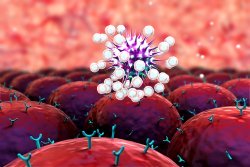Author:
History:
In
 Example:
Example:
As we age, immune function declines. As the result, in elderly age the risk of autoimmune pathologies (in this case, the immune system does not recognise structures of the own organism) increases.
Description of the Theory:
 According to the immunological theory, the immune system is programmed to decline its functions over time, and this fact is the main cause of aging.
According to the immunological theory, the immune system is programmed to decline its functions over time, and this fact is the main cause of aging.
The immune system has several important functions. It detects and destroys a wide variety of alien agents, and distinguish them from the organism’s own healthy cells and tissues, which are preserved from destruction. The efficiency of the immune system reaches the peak in the puberty, and then it gradually decreases. Thymic involution (shrinking of the thymus with age) is believed to be the main
 In most elderly people, immunosenescence is characterized by decreased resistance to infectious diseases and decreased protection against cancer. As the result, the risk of death becomes significantly higher in elderly age. Nowadays, death caused by such infections as pneumonia, influenza, nephritis and sepsis are on the first place among the main causes of death of people over 65 years old.
In most elderly people, immunosenescence is characterized by decreased resistance to infectious diseases and decreased protection against cancer. As the result, the risk of death becomes significantly higher in elderly age. Nowadays, death caused by such infections as pneumonia, influenza, nephritis and sepsis are on the first place among the main causes of death of people over 65 years old.
Last years, lots of intense scientific researches are held which can enhance immune function in elderly people, and as the result, slow down the process of aging. One of the directions of such researches — creation of the immune system cells using methods of genetic engineering — is developed by G. Pawelec, J. Macleod, A. Thomson. Another direction is the development of methods that allow delaying thymic involution. This direction is developed by G. Sempowski,
Additions and Сriticism:
 Up to date, the immunological theory has a lot of open questions. Particularly, there is no consensus about the supreme cause of the immune system senescence. Moreover, although the role of the immune system in aging processes is established, purely immune mechanism of aging is doubtful. The immunological theory is merging with neuroendocrine and free radical theories of aging.
Up to date, the immunological theory has a lot of open questions. Particularly, there is no consensus about the supreme cause of the immune system senescence. Moreover, although the role of the immune system in aging processes is established, purely immune mechanism of aging is doubtful. The immunological theory is merging with neuroendocrine and free radical theories of aging.
Publications:
- Fulop, Tamas, et al. «On the immunological theory of aging." (2014): 163–176.
- Franceschi, Claudio, et al. «The immunology of exceptional individuals: the lesson of centenarians." Immunology today 16.1 (1995): 12–16.
- George, Andrew JT, and Mary A. Ritter. «Thymic involution with ageing: obsolescence or good housekeeping?» Immunology today 17.6 (1996): 267–272.
- Daynes, R. A., and
B. A. Araneo . «Prevention and reversal of someage-associated changes in immunologic responses by supplemental dehydroepiandrosterone sulfate therapy." Aging, immunology and infectious disease 3.3 (1992): 135–154.